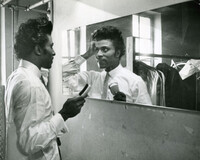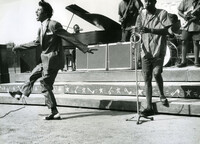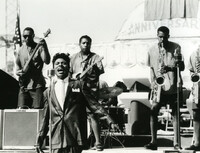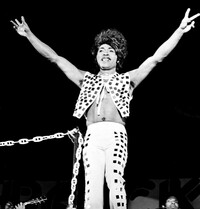Little Richard — or the Great Little Richard, to give him his full title — really was everything, or close to it. As we see in the exhilarating new documentary that takes off from this idea — "Little Richard: I Am Everything" — the late star lit up several worlds over the course of his 87 years. Born black and handicapped (one of his legs was shorter than the other) in Macon, Georgia, in the segregated South of 1932, Richard Penniman went on to become a drag queen, a cokehead, a Bible student, a husband and father, and, as he's said to have said, "The king and queen of rock and roll." (If anyone can find a source for this oft-asserted and admittedly delightful quote, please let me know.)
From the fall of 1955, when he released "Tutti Frutti" — the first in a spectacular run of 20-or-so fire-breathing rock 'n' roll sides on Specialty Records — to the summer of 1959, when his career started tapering off, Richard bestrode the world as a new kind of god, a motor-mouth deity who not only condoned male use of mascara and pancake makeup, but celebrated it, while also endorsing the most imposing sort of pompadour hairstyles and the roomiest of drape-shape suits. He wasn't the first full-blown rock-and-roller on the scene — Chuck Berry and Bo Diddley also scored early hits in 1955; Elvis Presley had started drawing attention in Memphis the previous year; and Fats Domino, down in New Orleans, had been moving units since 1949. But no one else could match Little Richard's frantic charisma. "He was like a meteor arriving," says Mick Jagger in "I Am Everything."
What sets this film apart from virtually every other rock bio-doc is the uncommon perspective of the people who made it. Music documentaries often seem to be the product of nostalgic white fans excavating the pop memories of their youth. The focus here is very different, and the difference is illuminating. Director Lisa Cortes, who is Black, started out with a desire to examine Richard and his mid-century milieu from a Black perspective, concentrating especially on the gay Black world of the period. (The many black-and-white photographs with which the picture is embellished — especially shots of Black drag bars in Macon and Atlanta in what appear to be the 1940s and '50s — are a tribute to the doggedness of the director's archival research.)
Cortes also brought in Dr. Zandria Robinson, among other talking-head observers (some of them eloquent, not all of them adequately identified). Robinson is a Memphis-born scholar with an ethnographic interest in popular music, which she has given a lot of thought. "The South," she says, "is the home of all things queer — of the grotesque, the different, the non-normative." If we accept this, we can imagine how the flamboyantly gay Richard Penniman (who also had a drag persona he called "Princess Lavonne") managed to make his way in such an uneasy world. He was fortunate in his gay and bisexual musical connections — first with the gospel singer and guitarist Sister Rosetta Tharpe, who first brought him out on a stage ("the greatest thing that ever happened to me," Richard says here. "I was ready to shine"); then with the Atlanta singer Billy Wright, who knocked Richard out with his green suits and matching green-and-gold boots ("I never seen a man dress like that," Richard says); and finally the demi-legendary proto-rock performer Esquerita, who coached Richard in the mysteries of the king-size pompadour and the frenzies of the pounding piano. Richard, a hyper-extrovert, was up for all of this. "You ain't supposed to hide nothin'," he says. "If you got it, God gave it. Show it to the world."
The movie uses copious amounts of prime period concert and TV footage to give us Richard at the dizzying height of his powers. "He spit on every rule there was in music," says director John Waters, a forever fan from the moment he heard him. "The first song that you love and your parents hate," Waters says, "is the beginning of the soundtrack of your life."
We follow Richard through the eruptive hitmaking years ("Long Tall Sally," "The Girl Can't Help It," "Lucille," the whole classic litany), see him flying off to Europe to meet the Beatles ("We were almost paralyzed with admiration," says John Lennon) and then the Rolling Stones ("That music, that beat, that voice," says Jagger. "I'd never seen any of it before").
By this point, Richard had strayed far from the gospel path on which he'd started out in his church-centered youth. "I had all these orgies goin' on," he says. "I didn't refuse nothin'." He drank too much, he sampled heroin, he became bitter about the minimal compensation he was receiving from Specialty. ("I saw all my friends on the hill, and I was still in the valley," he says.) Disastrously, in securing his departure from the label, Richard was persuaded to give up all future royalties from his records.
Some of what we see here will be familiar to Richard obsessives — like the wilderness years in which he quit the pop-music business and dedicated himself to the Lord. But there are glorious payoffs — among them a spine-tingling rendition of "Without Love." More painful is his 1989 appearance at a Rock and Roll Hall of Fame ceremony to induct the late Otis Redding. Facing an audience of industry movers and shakers — people who never paid him what he deserved, never even gave him a Grammy Award — Richard broke into a rendition of Redding's "I Can't Turn You Loose," to demonstrate that he still had it. The old magic. Nobody cared.
Little Richard's cultural significance is incalculable. It's hard to imagine people like David Bowie, Prince, Living Colour, Boy George, Harry Styles, and other performers breaking through in quite the same way without Richard's ice-breaking example to beckon them. And it was hard. At one point in the film, Richard describes being pulled off a stage somewhere in the South and beaten by police for playing black music for white teenagers. He wasn't trying to foment uproar, maybe, he just naturally did. "Sometimes," says the equally exuberant Billy Porter, stepping in to comment, "simply existing is a revolutionary act."
Kurt Loder is the film critic for Reason Online. To find out more about Kurt Loder and read features by other Creators writers and cartoonists, visit the Creators website at www.creators.com.










View Comments